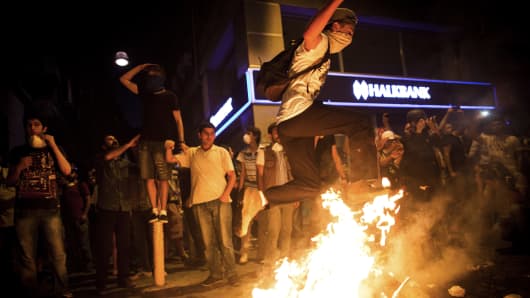More clashes between protesters and police have put Turkey's social unrest back in the spotlight, following unprecedented steps by the country's central bank to shore up its weakening currency.
Turkish police on Monday fired teargas and water cannons at protesters who tried to enter Gezi Park in Istanbul to protest again at the park's redevelopment– the original source of discontent that led thousands of Turkish people to demand a change of government last month.
But economists warned that further social unrest and unresolved political tensions would not help Turkey's unstable economy and cautious investor landscape.
"Further protests would undoubtedly damage the economy further," Nigel Rendell, senior economic policy adviser at Medley Global Advisors, told CNBC on Tuesday. "I don't think these current protests will get the same ground swell of support as before - the police will take a hard line in response to further protests - but they could certainly damage the economy."
The site of Monday's clashes was the focus of protests in late May and June when widespread social unrest gripped Turkey, threatening to bring down Prime Minister Tayyip Erdogan's government and damage the economy, which relies heavily on tourism and foreign investment.
"I was there a month ago and the hotels were half empty, the taxi drivers were complaining about a lack of business and I imagine now that… Turkey will be just be ahead of Egypt in people choosing their holiday destinations this year," Rendell added.
(Read More: Turkish Finance Minister: Protests a 'Hiccup' for Economy)
Neil Shearing, emerging markets economist at Capital Economics, said it was difficult to know what would happen next in Turkey. "A lot of the underlying issues seen in earlier protests have not gone away and they have even been exacerbated by the government's responses to them," he told CNBC.
"On the one hand there is the flare-up of social tensions against a more general backdrop of general concerns about the Federal Reserve tapering its monetary stimulus program which will have a particular effect on Turkey."
Turkey was once a key location for investors looking for higher yields in emerging markets, after monetary stimulus by central banks in Europe and the U.S. pushed government bond prices up and yields down.
Turkey experienced growth of 8.8 percent in 2011, the second fastest expansion after China, but since then its economic growth has slowed to expand by 2.2 percent last year.
The recent social and political unrest has not helped, with the yield on Turkey's benchmark two-year government bonds rising to 8.1 percent on Tuesday from a record low of 4.61 percent in May. The Turkish lira has also weakened - by almost ten percent against the dollar over the last six months.
On Monday, the Turkish central bank attempted to stop the currency's slide by selling a record amount of foreign-exchange reserves in seven back-to-back auctions. The bank sold $2.25 billion dollars, or around 5 percent of its net reserves, to shore up its currency - the most it has ever spent to do so.
The lira rebounded from its record low of 1.9734 against the dollar on Monday morning, but had only strengthened by around 1 percent to 1.9525 by Monday afternoon. On Tuesday morning, the lira was at 1.94 against the dollar.
(Read More: Turkish Turmoil: Scenes From Turkey's Protests)
"On the face of it, the intervention by Turkey's central bank was huge," Shearing added. "It was supposedly a massive demonstration of power by the Turkish central bank and all they got out of it was a paltry rally in the lira. History has shown us that central bank intervention in this way does not have a lasting effect."
Shearing said the Turkish central bank's foreign exchange reserves were, at $45 billion, not sizable. "To say you've burnt through about $2 billion of that in a day, like the central bank did - you can only do that for another 20 days and markets know that, making the effect on them insignificant."
Support for the lira would be hard to maintain unless interest rates rise too - a move that the central bank has so far resisted, he added. "I think that's the only thing that they can do. High interest rates suck in the capital. But I think we'll see market rates drift up - as we have seen - rather than policy rates."
(Read More: When Will Turkey Join the European Union?)
Timothy Ash, head of emerging market research at Standard Bank, called the move by the central bank a "currency war in reverse."
"The Turkish central bank has laid its cards squarely on the table through this action, letting it be known that it does not want to raise policy rates to defend the lira," he said.
"This is the emerging market (EM) currency war in reverse. In the first battle, EMs were forced to intervene to prevent forex appreciation… that was when money was flooding in to EMs. Now, with a U.S. recovery and prospects of tapering, money is flooding out and those EMs with the largest financing requirements (for example Turkey and probably the Ukraine) are most vulnerable now."
- By CNBC's Holly Ellyatt, folow her on Twitter @HollyEllyatt



